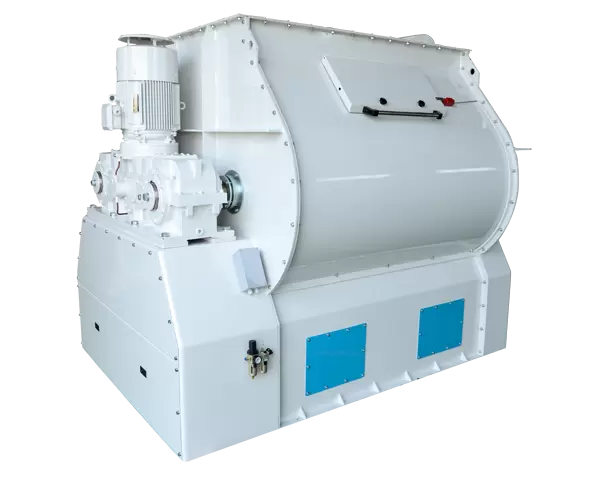- This topic is empty.
-
AuthorPosts
-
13/01/2025 at 13:55 #94443
Feed mixer is an indispensable equipment in modern animal husbandry, and it plays an important role in feed mixing in production. According to different structural designs, feed mixers are mainly divided into horizontal and vertical types. Choosing a suitable mixer is crucial to the efficiency and cost control of the farm. This article will analyze the differences between horizontal mixers and vertical mixers in detail from the aspects of working principle, mixing effect, applicable scenarios, floor space, energy consumption, maintenance and price, to help users make a wise choice.
1. Differences in design structure
Horizontal feed mixer: The horizontal mixer adopts a horizontal barrel structure, and is usually equipped with spiral mixing blades or paddles inside. The mixing blades are arranged at a specific angle so that the feed forms a complex convection motion during the mixing process, thereby achieving uniform mixing.
Vertical feed mixer: The mixing barrel of the vertical mixer is vertical, and is usually equipped with a vertical shaft mixing device inside, and the blades are spiral or other forms. The feed is mixed by the up and down flipping of the blades, and the feed particles are lifted from the bottom to the top and then fall naturally to complete the mixing.
2. Mixing effect
Due to its double-shaft or single-shaft mixing design, the horizontal mixer can continuously turn and cross-mix the feed in the mixing chamber, which can achieve a high uniformity mixing effect, and the coefficient of variation (CV value) is usually less than 5%. This is especially important for farms with high requirements for formula feed.
The mixing effect of the vertical mixer is relatively weak, and it is mainly suitable for scenes where the mixing uniformity is not high. Due to the large gravity effect, the raw materials may be stratified, especially the raw materials with large density differences. The CV value is generally around 10%.

3. Applicable scenarios
Horizontal feed mixer
Large feed factory
Farms with high requirements for feed quality
Formulated feed production
Scenarios involving the mixing of complex materials
Vertical feed mixer
Small and medium-sized farms
Temporary feed processing needs
Farmers with less initial investment.
4. Floor space
Due to the horizontal structure design, the horizontal mixer has a large floor space but a low height, which is more suitable for sites with spacious plant space but limited floor height.
Vertical mixer adopts a vertical design, with a small floor space, but a high equipment height. Suitable for environments with limited site area but ample floor height.
5. Energy consumption and efficiency
Horizontal mixers are usually equipped with higher power motors and have relatively high energy consumption, but their mixing efficiency is high, and they can complete the feed mixing task in a shorter time, with higher overall operating efficiency.
Vertical mixers have lower motor power and relatively lower operating energy consumption. However, due to the longer mixing time, the overall efficiency may be lower than that of horizontal mixers.
6. Equipment price
Horizontal mixers are usually more expensive due to their high technical requirements and high mixing efficiency. Small equipment starts at several thousand yuan, and large professional equipment may reach tens of thousands of yuan or even higher.
Vertical mixers have a simpler design, low production costs, and relatively affordable prices. They are suitable for small farmers with limited budgets.
7. User selection recommendations
According to production scale: horizontal mixers are recommended for large-scale production, and vertical mixers can be used for small-scale production.
According to feed type: If you produce highly viscous and humid feed, it is recommended to choose horizontal equipment. If you produce dry feed or pellet feed, vertical equipment is fully competent.
According to budget: High-budget users can choose horizontal mixers to pursue higher efficiency and uniformity. Low-budget users can consider vertical mixers, which are more cost-effective.
According to the factory conditions: factories with sufficient space are suitable for horizontal mixers. Plants with limited height but tight area can consider vertical equipment.
Horizontal feed mixers and vertical feed mixers have their own advantages and disadvantages, and the choice of the two should be based on actual needs. Horizontal mixers have powerful performance and high efficiency, but the price is relatively high, and they are more suitable for large-scale farms. Vertical mixers have simple structures and low costs, and are suitable for small farms or users with limited budgets. When purchasing, users need to comprehensively consider the type of feed, mixing uniformity requirements, site conditions and budget constraints to choose the most suitable equipment for themselves. At the same time, regular maintenance of the equipment after purchase can extend its service life and ensure maximum production efficiency.
As a professional feed mixer distributor, we are well aware of the differences in equipment needs of different users. We not only provide a variety of mixer equipment, but also tailor-made selection suggestions for customers to ensure that the equipment is accurately matched with production needs. At the same time, we also provide comprehensive after-sales services, including installation guidance, equipment maintenance and technical support, to ensure the long-term use effect of customers. Choosing us, you will not only get reliable equipment, but also enjoy professional and personalized service experience.
https://www.fast-js.com/
What is the difference between a horizontal feed mixer and a vertical feed mixer? -
AuthorPosts
- You must be logged in to reply to this topic.
